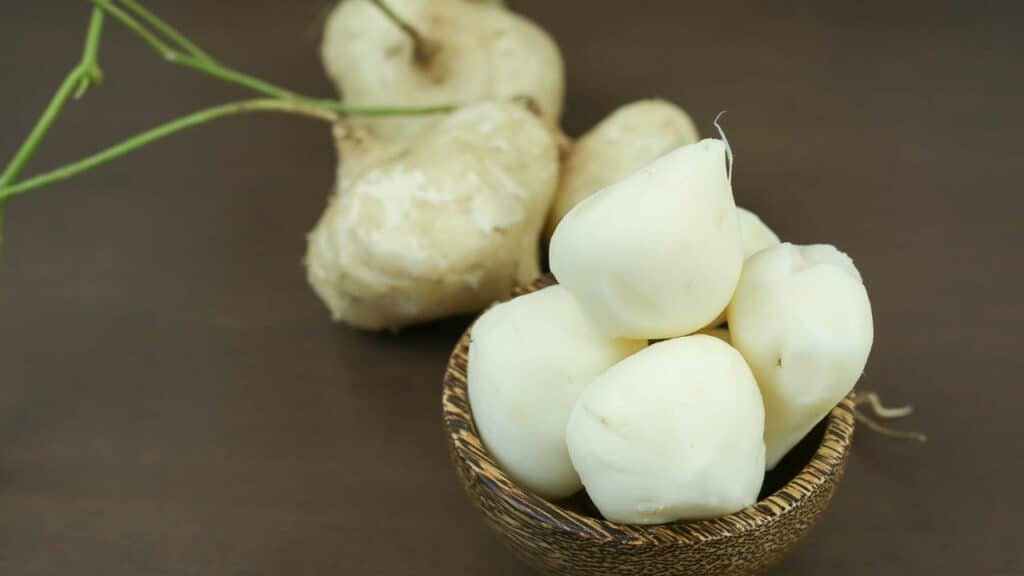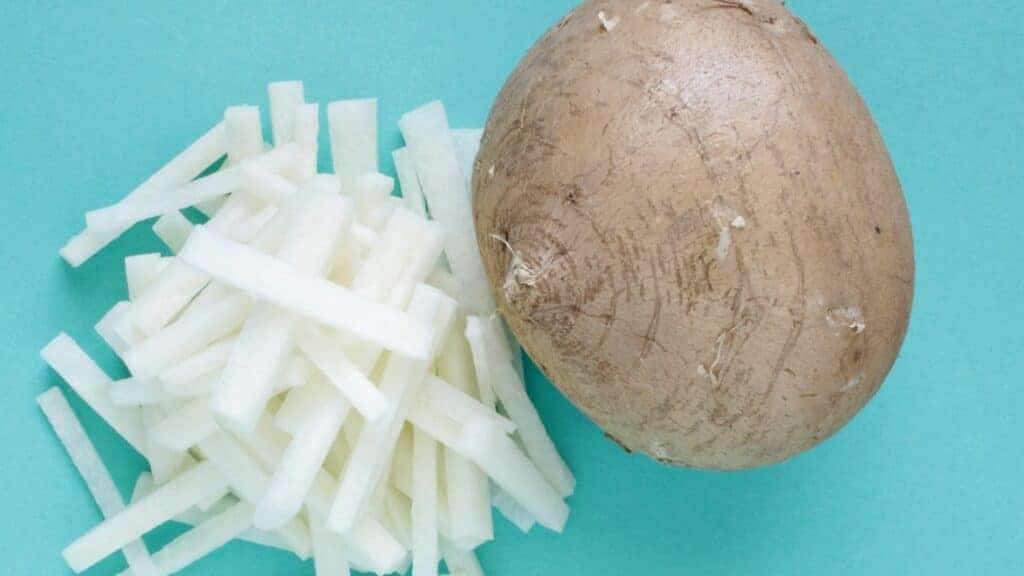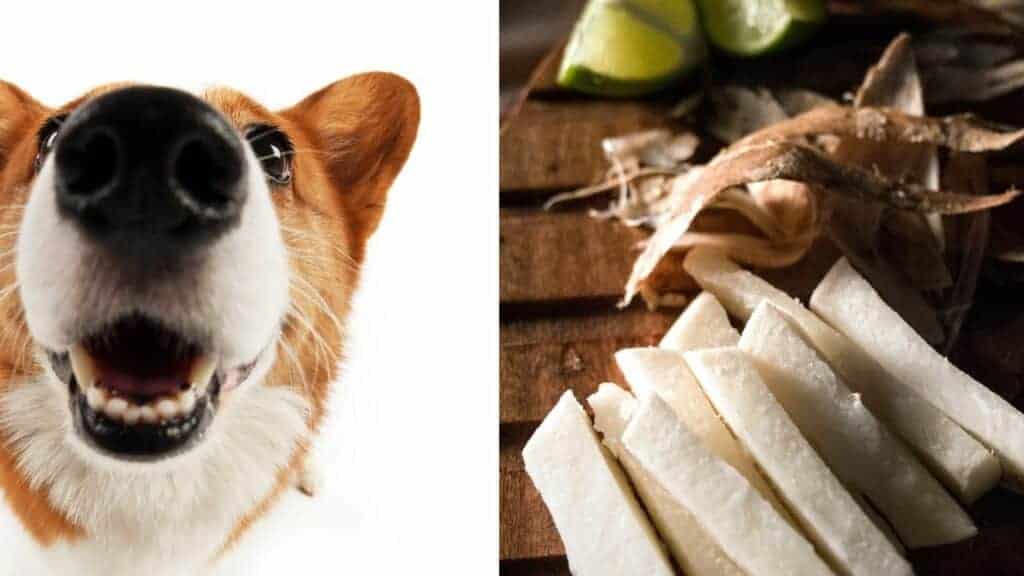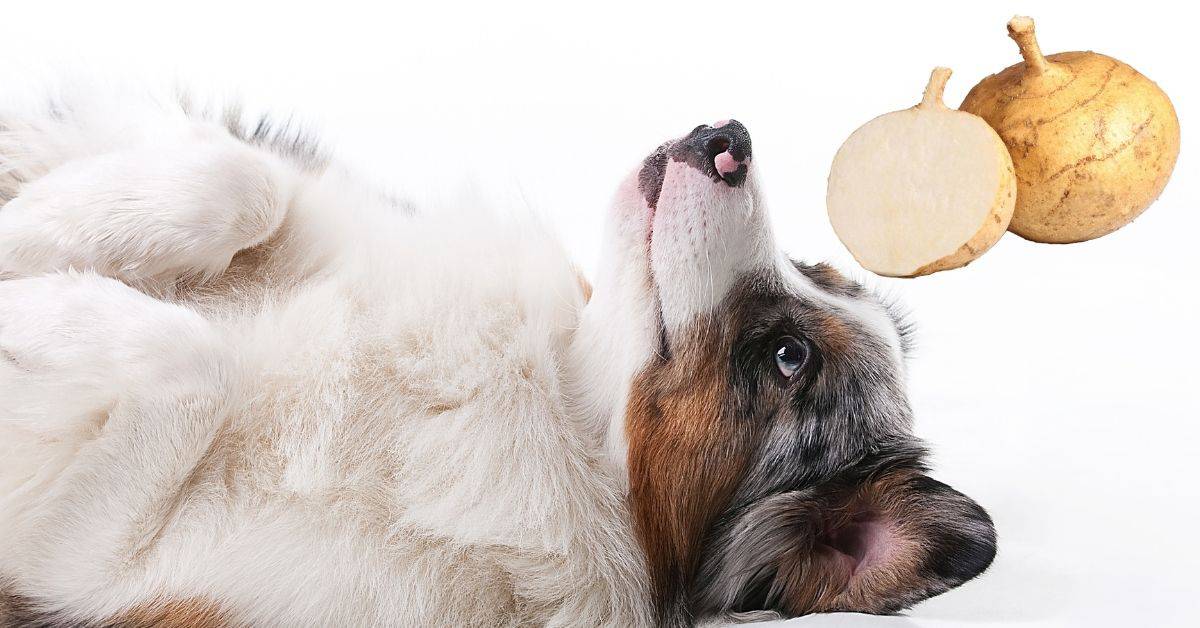The answer to the question, “Can dogs eat Jicama?” is yes.
Jicama can provide several nutritional benefits to dogs.
However, serve only peeled Jicama to your canine companions because other parts of the plant can be toxic.
Fresh jicama root, a low-calorie, nutrient-dense, and healthy treat, can supplement your dog’s diet.
In Mexico, South America, and Central America, this root vegetable is also known as:
Mexican yam bean
Mexican turnip
Mexican potato
Jicama contains essential vitamins, including vitamins C and A, and minerals, but excessive ingestion might poison your dog and cause other health problems.
When giving your dog jicama sticks, please don’t give them more than a quarter cup at once, and always peel the Jicama first.
Jicama should be introduced to your pet gradually, as with any new and fresh food.
As you know now the answer to the question “can dogs eat jicama”, continue reading to learn about the relationship between Jicama and dog health and if you want to ensure your dog’s health (benefits) at all times.
Jicama Benefits For Dogs

You can anticipate several positive effects on your dog’s health if you feed them jicama flesh.
This plant is a Mexican root vegetable; it is only logical that many people are unaware of all the benefits it offers both humans and dogs.
As soon as you read the following benefits of Jicama, you can stop worrying about whether dogs can eat it.
Low In Calories
You’ll be happy to know that the answer is yes to the query, “Is jicama beneficial to lose weight?”
Mexican potato is incredibly low in calories and fats and high in nutrients, so you may give it to your dog even if they are on a diet.
Giving your dog this vegetable will enable them to reduce their healthy weight without feeling continuously hungry or lacking energy.
Lots Of Vitamins
The vegetable from Central America is rich in vitamins, including vitamin C and A, which help your dog’s overall health.
Other antioxidants in Jicama include selenium, beta carotene, and vitamin E.
Jicama is one of the most excellent vegetables for dogs to keep their immune system strong and healthy if your dog has immune system issues.
In addition, Jicama might improve blood circulation and heart health as it has copper and iron in its structure, both required for red blood cells.

Antioxidants
Beta carotene, vitamin E, and other antioxidants in this vegetable may assist your dog’s body in resisting cell damage.
Antioxidants may lower your dog’s risk of contracting fatal diseases, including cancer, Alzheimer’s, heart disease, and other inflammatory conditions.
High In Minerals
This vegetable also benefits from being extremely rich in healthy minerals, including calcium, phosphorus, iron, and potassium.
These nutrients can considerably enhance your dog’s health and are crucial for it.
Excellent Source Of Fiber
This vegetable includes a lot of nutritional fibers that are good for both human and dog digestive systems, so dogs with stomach issues will gain a lot from eating it.
Great Source Of Inulin
It contains inulin, which is essential for your dog’s digestive system. Why?
This prebiotic fiber is excellent for your dog’s digestive health because it feeds its digestive tract with healthy bacteria that aid in overall gut health, immune health, and weight moderation.
Healthy gut bacteria can help your dog maintain regularity in their bowel movements, blood sugar, and cholesterol levels.
Optimal cholesterol levels are necessary for low blood pressure and to reduce your dog’s risk of developing heart disease or other cardiovascular issues.
Potential Risks Of Feeding Dogs Jicama

Despite the peeled flesh being harmless and recommended, the stems, skin seed, and leaves contain Rotenone, a dangerous dog drug.
Some dogs might not eat anything like raw jicama flesh.
Its effects on the stomach are mainly digestive tract and may cause problems when ingested by dogs if they are too sensitive.
Always seek veterinary guidance; he will provide veterinary advice regarding the dog’s diet.
Get more detailed information about the potential health risks of feeding Jicama as dog food.
Poisoning
The root bulb is the sole component that can be fed to your furry friend without risk.
Its bean pods, seeds, and leaves are all poisonous and can cause dogs to become intoxicated.
Ensure your pet doesn’t nibble on the plant’s above-ground sections if you cultivate it in your garden.
Digestive Problems And Constipation
Jicama’s high dietary fibers can help your dog’s digestion, but too much of this fibrous root vegetable may make it difficult for your dog’s stomach to digest.
Constipation can result from little bits of undigested Jicama getting stuck in your pet’s digestive system and blocking their intestines.
Gastrointestinal Problems
Jicama includes inulin, a dietary fiber that, if consumed in significant amounts by your pet, can result in gas, bloating, and upset stomach.
The digestive symptoms in your furry friend will probably go away in a few days, but if your pet has severe diarrhea or vomiting—either of which can cause dehydration—you should be concerned.
How Much Jicama Can A Dog Have?

Jicama should be introduced to dogs gradually, as with any new food, and the serving size will depend on your dog’s size.
Start by giving your canine companion a couple of sticks daily to avoid choking hazards.
The vegetable is a safe vegetable to feed your dog and a great source of prebiotic fiber (essential food for the good bacteria in humans).
What Is Part Of Jicama Toxic?
Before feeding Jicama to your dog, always wash and peel the root vegetable.
Raw jicama skin, seeds, leaves, and stems can harm your dog’s health because they are toxic.
They all include small quantities of Rotenone, an insecticide that is a naturally occurring substance.
Dog owners should remove the skin of the root bulb of the Jicama and cut the inner, crunchy flesh into bite-sized pieces before offering it to their dogs.
How To Prepare Jicama For Dogs
Your dog can still consume Jicama raw, just like you would, even if you shouldn’t dip it in anything.
For dogs, Jicama can be grilled or boiled.
If you want to use either of these cooking methods, use caution when using any spices.
If your dog enjoys the crunch of Jicama, it might also enjoy cucumbers.
Conclusion: Can Dogs Eat Jicama?

As you now know, the answer to the question “Can dogs eat Jicama?”
It’s an excellent addition to your pet’s diet.
Jicama has several advantages that enhance your dog’s general health and contains minerals that are excellent for its digestive system.
There are risky and safe ways to give your dog this vegetable.
It’s essential always to wash and peel Jicama before you let your dog eat the vegetable.
Dog owners may be tempted to overfeed their canines due to the health advantages of the tuberous root.
Overeating, however, has the potential to be more harmful than beneficial.
Jicama should only be consumed on occasion as most human foods that dogs can eat.
Instead of replacing dog food, it should be a supplement.
The jicama plant carries some health hazards.
Before feeding your dog, remove the leaves, stems, seeds, and skin.
Jicama is an excellent source of vitamins and minerals for your dog, but if the toxic skin, stock, and leaves aren’t removed, the vine can be just as harmful to canines.
Before You Go…
Now you know the answer to the question, “Can dogs eat jicama?”.
If you want to learn more, read the following articles too!


